This past Sunday, TV watchers not drawn in by The Idol’s soft-core glowering may have experienced a pang of absence, suddenly aware of the Succession-shaped hole in their schedule of appointment viewing.
A mourning period follows the conclusion of any series with that degree of buzzy ubiquity and the only way to bust through the doldrums is with a good, satisfying rebound. Below, we’ve rounded up a handful of shows that might fulfill the lingering jones for antics from the Roy gang, organized by the primary dimensions of its appeal.
CORPORATE INTRIGUE
Industry
A channel-surfer doesn’t even have to leave HBO to remain in the milieu of hostile takeovers and blue-chip portfolios, though this one goes bottom-up instead of top-down. Rather than the C-suite, creators Mickey Down and Konrad Kay track a group of hungry recent grads as they climb over each other’s knife-studded backs toward a full-time position at an uppermost-tier investment bank in London. During their six-month trial period that comprises the first season, however, they mostly chart exotic new frontiers of sexual deviancy and ingest the full smorgasbord of controlled substances available on Wall Street. While the drama pays closer attention to the R-rated shenanigans of telegenic young people, Pierpoint nonetheless shares an office culture with Waystar/Royco in broad strokes: a toxic atmosphere of harassment, hollow promises to sluice out the poison, a carefully designed system of plausible deniabilities to insulate and protect the monsters at the top.
Billions
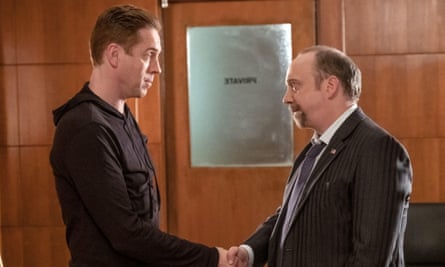
Who doesn’t love watching guys in suits yell at each other in boardrooms, especially when said guys happen to be heavyweight thespians Damien Lewis and Paul Giamatti? Showtime’s still-running marquee title offers dual perspectives on high finance by pitting a hedge fund manager who’ll break any law he pleases to ensure robust returns for his elite clients against the BDSM-enthusiast federal attorney hot on his trail. The fun of their cat-and-mouse game comes from 1) the agility of their maneuvers, each one wriggling out of defeat just as it seems like the other finally has them licked and 2) the panoply of supporting appearances from character actors having a ball, foremost among them the squirrelly David Costabile as a lecherous, coke-addicted COO too good at his job to fire. As they shoot inside-baseball money lingo at each other like spitballs, a clash of titans in the same Shakespearean vein as the Roys’ squabbles unfurls, stretching all the way down to hell.
Kings
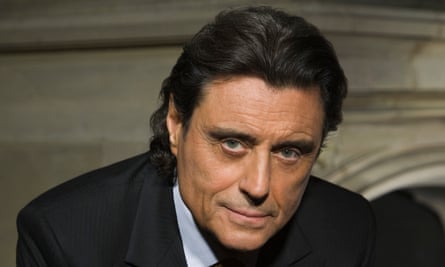
Michael Green’s short-lived, cult-beloved reconfiguration of biblical myth went to some transcendently odd places, but at its core, it told a story of succession. Even if the modern monarchy of Gilboa may not be a business by the strictest definition, the jockeying for power among its king, his heirs and their various courtiers closely mirrors the machiavellian doings at any given Fortune500 company. The daily order around their stronghold includes betrayal, secret alliances and playing both sides against the middle, a more grounded (relatively, that is, very relatively) companion to the royal plotting on Game of Thrones. Plus, you’ve got Ian McShane as a booming, unknowable old tyrant more than capable of giving Logan Roy a run for his blood-flecked money. Succession’s emphasis on keeping Waystar in the bloodline and weathering attacks from foreign invaders implied the setting as a fiefdom updated for the present, a metaphor that this underrated gem turns inside out.
BIG, FRACTIOUS FAMILIES
Arrested Development
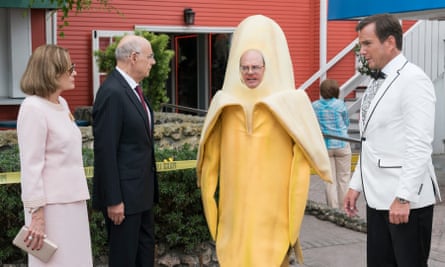
We’re far from the first to point out the similarities between these two shows about a conglomerate in jeopardy, the greying paterfamilias in charge, the boob eldest son unfit for the throne, the competent middle son prone to getting in his own way, the cunning yet short-sighted daughter sick of being pushed to one side and the neurosis-ridden youngest son bound to a deeply dysfunctional carnal relationship with a woman multiple decades his senior. The consistency of these character dynamics makes the connection impossible to miss, down to their core truth that siblings never really age out of their childhood slapfights. With the gamesmanship of adults, they use unrelated animosities to relitigate simmering lifelong resentments about spilled ice cream, prom mishaps and other immature pettinesses – you know, hence the title. And if you’re one of the remaining 17 people on Earth who hasn’t yet seen this gold-standard sitcom, it’s about time you stopped nodding and politely smiling whenever someone says that “there’s always money in the banana stand!”
Six Feet Under
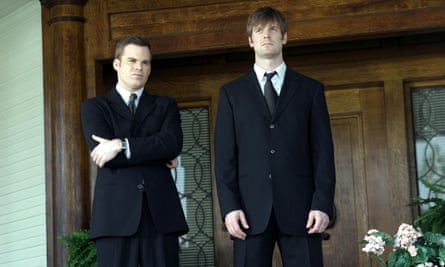
Imagine if Succession revolved around a business no one really cared to hoard for themselves, if Logan had died in the pilot and loomed over his grown offspring in absentia, if prodigal son Kendall was twice the chronic screwup, if Roman felt frightened by his own forbidden desires instead of nurturing them like little potted succulents, if the hyper-online discourse-speak was replaced by a vernacular considered cutting-edge in the early Dubya years, then yeah, it’s pretty much the same show. Alan Ball’s boundary-bursting funeral home soap opera spoke to themes of mortality, homosexuality and middle-class false pieties with frankness bold for its moment, but the rich character work stands the test of time more sturdily. Whether in recognizing the vulnerable humanity of our parents or coming to accept the autonomy of our children, some psychological rites of passage never fade away. Lest we forget Tolstoy’s immortal axiom about happy and unhappy families …
The Righteous Gemstones
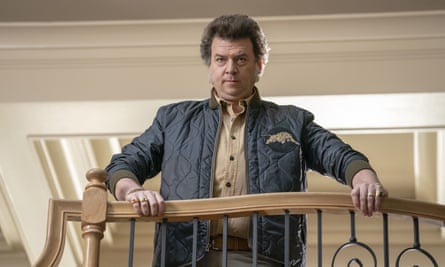
Yet another mad grab for Daddy’s seat of authority amongst a triumvirate of feckless siblings – and on HBO, at that! – though it’s set apart from the pack by a more unambiguously down-the-middle commitment to comedy. Megachurch scions Jesse (Danny McBride), Judy (Edi Patterson, a treasure) and Kelvin (Adam DeVine) Gemstone offer a tasting menu for different flavors of idiocy, from eldest Jesse’s impotent bluster to middle kid Judy’s blinkered overconfidence to baby Kelvin’s runt-of-the-litter Napoleon complex. They all want to get in good with papa Eli (a god-mode John Goodman as a man of God), but their scripture-esque foibles always push them back on their asses with elaborate farce. The satire of Christian capitalism draws some real blood, too, taking the prosperity-gospel set to task with an insider’s look at how they translate faith to dollar signs. Praise be, for blest are we all.
BRIT WITS
The Thick of It

Succession creator Jesse Armstrong was a key member of the writing team for Armando Iannucci’s send-up of British government’s self-serving, ineffectual, existentially futile day-to-day. A bumbling minister and his harried staffers (fan-favorite among them the department’s rage-aholic enforcer Malcolm Tucker, played by Peter Capaldi with unparalleled wrath) try to make it through each week without major calamity or scandal, only to hoist themselves by their own petards at every opportunity. The clear jabs at lumpen UK politics often serve as elegant scaffolding on which to mount the arias of obscenity we’ve heard come from the mouths of the Roys; the supercuts of florid, quasi-Shakespearean verbal abuse will instantly sell the rest of the show. (And don’t miss the feature film spin-off In the Loop, which sees Tucker lock horns with none other than James Gandolfini in a role softer-spoken than Tony Soprano yet every bit as grizzly-bear brawny.)
Yes, Minister
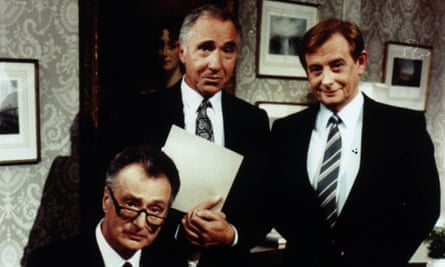
In many ways the 20th-century precedent to The Thick of It (or perhaps a daffier across-the-pond West Wing), this peep into the cabinet madhouse was well-known as the favorite TV show of Margaret Thatcher, then prime minister, a damning sort of referendum on the sharpness of its critiques. Creators Anton Jay and Jonathan Lynn may have taken a softball approach in comparison to the venom of their disciples – protagonist MP Jim Hacker has no discernible party affiliation, for instance – but the pound-for-pound laugh-age makes it easy to see how this classic became so influential. Anchored by Hacker’s guileless bumbling, the rousing big speeches of his manipulative right hand Sir Humphrey Appleby (Nigel Hawthorne), and the congenial dimness of grunt Bernard Woolley (Derek Fowlds), the snappy, highbrow repartee treated its viewership like theatregoers instead of couch potatoes. With an unexpected rejection of cynicism, it portrayed political wheeling and dealing as stiff-lipped silliness.
Spitting Image
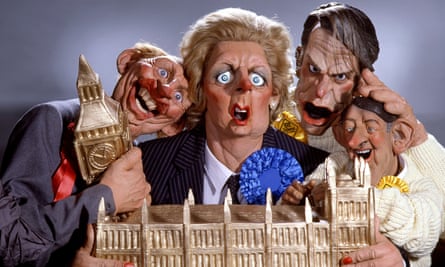
Surely the most popular show enacted by a cast of hideous puppets, this unlikely landmark of small-screen English comedy took the piss from politicos, athletes, news presenters, comedians, musicians, actors and any other public figure with a notable physical feature to caricature. Imagine a precursor to Celebrity Deathmatch with about 60 more IQ points and a more grotesque relationship to style, the horrible exaggerations of each handmade creation the most cutting aspect of the lampooning. Each parodied guest – Paul McCartney, Dustin Hoffman, the Queen Mum – can be reduced to a single joke carrying the sketch, a simple yet durable method that’s worked for years on Saturday Night Live, and they were hampered by flesh-and-blood actors. Spitting Image’s targeting of the royal family was exceptionally bold for the ITV network; according to an off-the-books request from Queen Elizabeth II’s husband, some scenes featuring the royals were snipped from the pilot, but then stuck back into later episodes.
LIFESTYLES OF THE RICH AND NON-FAMOUS
Revenge

Sometimes we want to indulge in the immediate escapist pleasures of fabulously rich people behaving badly and few series service the urge with such generous directness as this guiltless pleasure lacquering prestige polish on to daytime-soap subterfuge. Emily Thorne (Emily VanCamp), so named because she’s beautiful and dangerous like an untrimmed rose, has returned to the Hamptons incognito to wreak her long-awaited vengeance on the hoity-toity Grayson clan responsible for her father’s framing and wrongful imprisonment all those years ago. As she sets about destroying her snooty nemeses from the inside out, the action straddles the line between straight-faced drama and uproarious self-parody, every absurd turn of the plot deserving of the obligatory minor-chord musical sting. Fixated on the sexy machinations of the aggressively telegenic, the show embraces and elevates trash TV to the purest, most gratuitously entertaining version of itself.
Dynasty
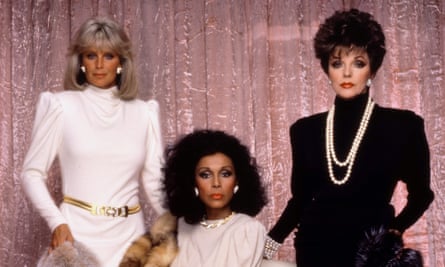
Pay no attention to the CW’s recent glossy remake; the genuine article from 1981 remains the one soap to rule them all, so addictively shameless in its cliffhanging and ginning-up of suspense. For a whopping 220 episodes, the project conceived as a competitor for time-slot rival Dallas followed the oil-moneyed Carringtons as they pressed their saga into an over-the-top diamond of camp all its own. They pulled out every twist in the book to keep things lively over eight years, not so much jumping the shark as they did blast off right over it: affairs, closet cases, double-crossings, mistaken identities, amnesia, twins, heart transplants and everything else that could possibly happen made this modern tragedy the #1 show on the airwaves for years. Take note of how the Carringtons treat themselves a whole lot better than the Roys, appreciating the finer things (extravagant outfits, lavish dinners, silver-plated bon mots) that come with a lifestyle no one on Succession took their time to enjoy.
Empire

Taraji P Henson stomps through her scenes like Godzilla in a pair of Louboutins as the incomparable Cookie, fierce matriarch of the broken pride of Lyons that reign over record label Empire Entertainment. Fresh out the feds, she returns to usurp ex-husband Lucious (Terrence Howard doing Jay-Z, essentially) and claim the CEO position she believes belongs to her with the help of their conflicted sons Andre (Trai Byers, the brainy one), Jamal (Jussie Smollett, the sensitive one), and Hakeem (Bryshere Y Gray, the charismatic one). Modified by a Black cast and creative team, modernizing the model of Dynasty and Dallas for today’s Black audiences, the show upped the ante with fights that ran hotter, hookups that went steamier and stakes that climbed higher. But Henson runs the show, dispensing at least two electrifying moments every hour. “The streets ain’t made for everybody,” as Cookie says. “That’s why they made sidewalks.”

